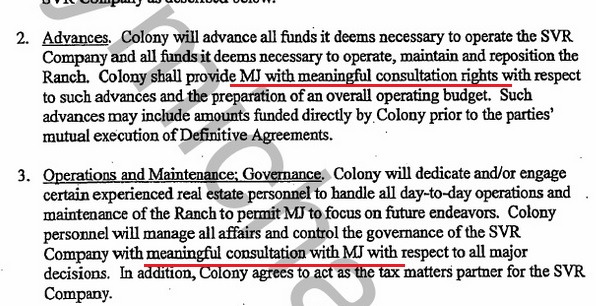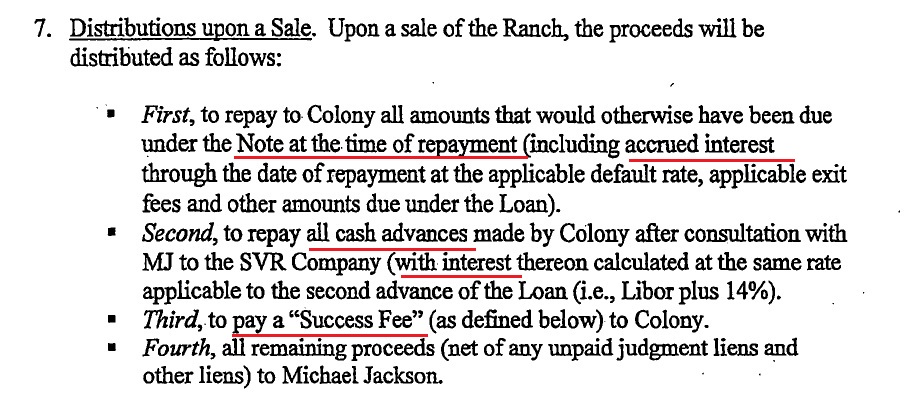For a long time Neverland Ranch related topics have been creating a lot of interest and discussion among the fans. With the recent news of Neverland is up for sale for $100 Million, I wanted to do an overview of what we learned over time.
In 2008 first came the Neverland foreclosure news, followed by the news of MJ- Colony Capital Neverland deal. At that time it was widely reported that this was a joint venture between MJ and Colony Capital – meaning both MJ and Colony Capital were part owners ( AP Link, TMZ Link).
After MJ’s death, we were able to see MJ Estate’s accounting filed in probate court. All three accounting documents to date listed that Estate has 87.5% undivided interest in Neverland.

So to recap, we knew MJ (and later MJ Estate) was in a joint venture with Colony Capital, they were co-owners and had 87.5% interest in Neverland.
Based on the available information, especially due to joint venture and 87.5% interest, fans assumed this meant MJ (and later MJ Estate) had equal decision power as Colony Capital.
In July 2014, MJ Estate sent out a statement to fans alerting them Colony Capital would be selling Neverland soon. In this statement Estate referred to Colony Capital as “property manager” and stated Colony has the “right to sell Neverland” under the MJ-Colony Capital Neverland deal. This created heated discussions as it went against the common belief about Neverland situation. At that time we still did not know the specifics of MJ – Colony Capital Neverland deal.
In February 2015, fans finally got access to the MJ – Colony Capital Neverland deal. Tohme filed a copy of the deal as an exhibit for his finder’s fee lawsuit against Estate. February 2015 was the time when we had a better understanding of the situation.
First the Neverland deal documents confirmed that this was a joint venture between MJ and Colony Capital and indeed MJ had 87.5% undivided interest. This was true in 2008, it is still true today. MJ Estate is a co-owner of Neverland with 87.5% undivided interest.

The issue is not ownership but equity and power. Forbes explained the equity situation in July 2014, “For every dollar the company (Colony Capital) invested in the property, its equity would increase. This meant that while Jackson—and, later, his estate—retained a stake in the property, it decreased on paper as time went on.” (Link) So while MJ (and later MJ Estate) still co-owned the property, the value of their share decreased every day. By February 2015, Neverland deal documents would provide more information about the financial situation.(more about this later on)
Neverland deal documents provided us a lot of new information we did not know before. We learned the goal of the deal was to “own, operate, reposition and sell Neverland”. Furthermore the documents stated Colony aimed to sell Neverland within 12 months (Neverland deal was finalized by November 2008, 12 months would be November 2009).


12 month quick sale plan can further be confirmed by a June 13, 2009 (12 days before MJ’s death) article on Wall Street Journal in which Tom Barrack is quoted mentioning the plan to put Neverland on sale, how they spent over $3 million on renovations and his belief that Neverland can fetch $70 to $90 Million. (Link)

From Neverland deal documents, we learned that unfortunately fans were mistaken about their expectations of control/power MJ (and later MJ Estate had). It turns out Colony Capital was the managing member (thus Estate referring to them as “property manager” in their July 2014 statement). MJ’s (and later MJ Estate’s) rights were limited to “meaningful consultation” and most decisions did not require a written approval of MJ (and later MJ Estate).


Furthermore it turned out Colony Capital can indeed sell Neverland for a fair market value without approval of MJ (and later MJ Estate) – confirming Estate’s statement that they aren’t in a position to stop the sale.

Although document states Colony Capital would consult with MJ before deciding to put Neverland up for sale, they don't need his approval or consent. For example when Colony Capital receives an offer for the ranch (even under the fair market value), they would give MJ (and later his Estate) 5 business days to match the offer. If MJ (MJ Estate) doesn't match the offer, it would be deemed that MJ (MJ Estate) consented the sale.

One possible question that comes to mind is even if Estate cannot stop a sale, can they buy Neverland? Answer to that is yes. Neverland deal documents show that MJ (and later MJ Estate) has “right of first offer” which means when Colony decided to sell the property; MJ (MJ Estate) could make an offer at market value. Similarly as mentioned above MJ (and later MJ Estate) have the right to match any offer received even if it's under market value.

Next logical question to ask is “Why isn’t the Estate making an offer?”. In their latest statement dated June 2015, Estate states it "would not be fiscally responsible for the Estate to spend Michael’s children’s money on purchasing the property again.”. This brings us back to the financial aspect and the equity issue. Neverland deal documents shows the details of the financial terms.


Colony Capital is to be paid the original loan + interest, reimbursed for the money they spend on operating/ maintaining Neverland + interest and a 12.5% success fee (at least $3.3 Million). Rest of the money goes to MJ (and now MJ Estate)
Just to get an idea of the money amounts, I will include a hypothetical very rough calculation example. I want to explicitly state that this is just a hypothetical example with intentionally very simplified (and even flawed) calculations to keep it as simple as possible and these are ABSOLUTELY NOT the actual numbers or correct amounts.
We know the original loan amount was $23 million. First $23 Million plus interest needs to be paid to Colony Capital. Assuming a low 10% interest rate and simple interest calculation, the loan debt would be now around $39 Million. (With higher interest rates and/or compound interest calculation numbers would be higher)
Next there would be money spent on operating/maintaining Neverland plus interest. It has been reported during MJ’s lifetime costs of maintaining Neverland was about $5 Million a year. In 2009 WSJ article, Barrack stated they spent over $3 Million on renovation in a year. So assuming $3 Million first year and then $1 Million a year, operating /maintaining expenses would be around $9 million without any interest. Assuming a low 10% interest rate, $3 Million start amount and $1 million yearly addition, the costs of operating/maintaining Neverland plus interest would be around $14 Million. (Obviously with higher annual costs and higher interest rates, the numbers would be higher. For example if we assume Colony spent $3 Million every year, total cost + interest would be around $28 million)
Then there’s also Colony Capital’s 12.5% interest or success rate of the net proceeds. Per documents it would be at least $3.3 Million. Based on a 12.5% of $100 Million sale price minus $23 M loan , it could be as much as $9.6 Million. So depending on the situation this success fee could range any where from $3.3 Million to $10 Million.
I guess it is obvious why MJ Estate referred to this situation as “unfavorable financial terms” and “not fiscally responsible”. As Forbes mentioned in July 2014, to buy back Neverland would easily require Estate to spend over $50 Million. Plus there's also the disputed 10% fee of Tohme from any future sale.
One final question that comes to mind is “Can Estate afford to buy Neverland?”. You will hear differing opinions from fans. I personally will refrain from making a definitive statement either way however I also think fans do not necessarily have a clear understanding of Estate’s financial affairs. So I want to mention a few points. While it is true that Estate has earned more than $600 Million as of December 2013 (per their accounting documents), these numbers are gross earnings numbers. Net income and cash remaining at hand after deducting all the expenses, income taxes, allowances, salaries, loan payments are significantly less. It’s also true that Sony/ATV (meaning including Estate) has bought EMI catalog but according to the leaked Sony emails, the loan for acquiring EMI catalog is being paid from the proceeds of the catalog – not directly from Estate’s earnings. With Sony/ATV debt still being paid and an Estate tax bill still in dispute, Estate might have felt it’s not wise to spend tens of millions to buy back Neverland. Each fan would make their own mind about if Estate could afford to buy back Neverland.
Here's the link to MJ- Colony Capital Neverland deal: http://www.scribd.com/doc/255769393/Colony-Capital-MJ-Neverland-Deal
Here's a previous post I wrote about MJ- Colony Capital deal : http://dailymichael.com/lawsuits/estate-v-tohme/293-exclusive-to-sell-neverland-was-the-goal-of-colony-capital-and-mj-all-along
One personal note: A collection of screencaps of my tweets and forum posts about Neverland dating back to 2011 to 2013 is making rounds with the accusation that I and other fans “lied” about Neverland. The information on those tweets/posts was correct based on what we knew back in the day. Some information is still true to this day -such as joint-venture, co-ownership, 87.5% interest. Plus it's a fact that Neverland was not for sale during 2012-2013. Everyone knows that Neverland has just been listed for sale on May 2015. However as I mentioned in the above post, fans didn’t know about Colony Capital having more control/power and the equity situation until July 2014 – February 2015 and there was a mistaken assumption/expectation in that regard. I imagine rational people realize everything fans say/write is based on the available information and none of us have access to the perfect/full information. It's quite unreasonable and unfair to take a piece of information that only became known in 2014/2015 and blame people for not knowing it years before. Rational people will also realize that it is also possible with time we get access to more information and our conclusions/take of the situation will change with more information/knowledge.